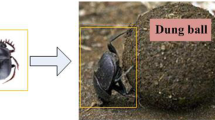Abstract
The shuffled frog leaping (SFL) optimization algorithm has been successful in solving a wide range of real-valued optimization problems. In this paper we present a discrete version of this algorithm and compare its performance with a SFL algorithm, a binary genetic algorithm (BGA), and a discrete particle swarm optimization (DPSO) algorithm on seven low dimensional and five high dimensional benchmark problems. The obtained results demonstrate that our proposed algorithm, i.e. the DSFL, outperforms the BGA and the DPSO in terms of both success rate and speed. On low dimensional functions and for large values of tolerance the DSFL is slower than the SFL, but their success rates are equal. Part of this slowness could be attributed to the extra bits used for data coding. By increasing number of variables and the required precision of answer, the DSFL performs very well in terms of both speed and success rate. For high dimensional problems, for intrinsically discrete problems, also when the required precision of answer is high, the DSFL is the most efficient method.
Similar content being viewed by others
References
Afshinmanesh F, Marandi A, Rahimi-Kian R (2005) A novel binary particle swarm optimization method using artificial immune system. In: IEEE international conference on computer as a tool, pp 217–220
Al-kazemi B (2002) Multi-phase particle swarm optimization. Dissertation, University of Syracuse
Al-kazemi B, Mohan CK (2002a) Training feed forward neural networks using multi-phase particle swarm optimization. In: Proceeding of the IEEE international conference on neural information processing, pp 2615–2619
Al-kazemi B, Mohan CK (2002b) Multi-phase discrete particle swarm optimization. In: proceeding of international workshop on frontiers on evolutionary algorithms. Research Triangle Park, pp 622–625
Al-Tabtabai H, Alex PA (1999) Using genetic algorithms to solve optimization problems in construction Engineering. Constr Archit Manag 6(2): 121–132
Chelouah R, Siarry P (2005) A hybrid method combining continuous tabu search and Nelder–Mead simples algorithms for the global optimization of multi minima functions. Eur J Oper Res 161: 636–654
Clerc M, Kennedy J (2002) The particle swarm-explosion, stability, and convergence in a multi-dimensional complex space. IEEE Trans Evol Comput 6(1): 58–73
Eberhart RC, Kennedy J (1997) A discrete binary version of the particle swarm algorithm. In: Proceeding of the IEEE international conference on systemics, cybernetics and informatics, pp 4104–4109
Eberhart RC, Shi Y (2001) Particle swarm optimization: developments, applications and resources. In: Proceeding of the 2001 congress on evolutionary computation, pp 81–86
Elbeltagi E, Hegazy T, Grierson D (2005) Comparison among five evolutionary-based optimization algorithms. Adv Eng Inf 19: 43–53
Eusuff MM, Lansey KE (2003) Optimization of water distribution network design using the shuffled frog leaping algorithm. J Water Resour Plan Manag 129(3): 210–225
Goldberg DE (1989) Genetic algorithms in search, optimization and machine learning. Addison-Wesley Longman, Boston
Grierson DE, Khajehpour S (2002) Method for conceptual design applied to office buildings. Comput Civil Eng 16(2): 83–103
Haupt RL, Haupt SE (2004) Practical genetic algorithms. Wiley, New York
Hegazy T (1999) Optimization of construction time-cost trade-off analysis using genetic algorithms. Can J civil Eng 26(6): 685–697
Holland JH (1975) Adaptation in natural and artificial systems. University of Michigan Press; Extended new Edition, MIT Press, Cambridge, 1992
Joglekar A, Tungare M (2003) Genetic algorithms and their use in the design of evolvable hardware. http://www.manastungare.com/articles/genetic/genetic-algorithms.pdf
Kennedy J, Eberhart R (1995) Particle swarm optimization. In: Proceeding of the IEEE international conference on neural networks, pp 1942–1948
Kennedy J, Spears WM (1998) Matching algorithms to problems: an experimental test of the particle swarm and genetic algorithms on multi-modal problem generator. In: Proceeding of the IEEE international conference on evolutionary computation, pp 78–83
Lee CY, Yao X (2004) Evolutionary programming using mutations based on the levy probability distribution. IEEE Trans Evol Comput 8(1): 1–13
Leung YW, Wang Y (2001) An orthogonal genetic algorithm with quantization for global numerical optimization. IEEE Trans Evol Comput 5(1): 41–53
Liu B, Wang L, Jin CYH, Tang DF, Huang DX (2005) Improved particle swarm optimization combined with chaos. Chaos Solitons Fractals 25(5): 1261–1271
Lovbjerg M (2002) Improving particle swarm optimization by hybridization of stochastic search heuristics and self-organized criticality. Dissertation, University of Aarhus
Sharaf AM, El-Gammal A (2009) A novel discrete multi-objective particle swarm optimization (MOPSO) of Optimal Shunt Power filter. In: IEEE conference on power systems, pp 1–7
Shi Y (2004) Particle swarm optimization. Inc. IEEE Neural Network Society, pp 8–13
Tseng CT, Liao CJ (2007) A discrete particle swarm optimization for lot-streaming flowshop scheduling problem. Eur J Oper Res 191(2): 360–373
Xu Y, Chen G, Yu J (2006) Three sub-swarm discrete particle swarm optimization algorithm. In: IEEE international conference on information acquisition, pp 1224–1228
Xu Y, Wang Q, Hu J (2008) An improved discrete particle swarm optimization based on cooperative swarms. In: IEEE international conference on web intelligence and intelligent agent technology, pp 79–82
Yao X, Liu Y, Lin G (1999) Evolutionary programming made faster. IEEE Trans Evol Comput 3(2): 82–102
Zhang YL, Ma LH, Zhang LY, Qian JX (2003) On the convergence analysis and parameter selection in particle swarm optimization. In: International conference on machine learning and cybernetic, pp 1802–1807
Author information
Authors and Affiliations
Corresponding author
Rights and permissions
About this article
Cite this article
Vakil Baghmisheh, M.T., Madani, K. & Navarbaf, A. A discrete shuffled frog optimization algorithm. Artif Intell Rev 36, 267–284 (2011). https://doi.org/10.1007/s10462-011-9213-2
Published:
Issue Date:
DOI: https://doi.org/10.1007/s10462-011-9213-2




